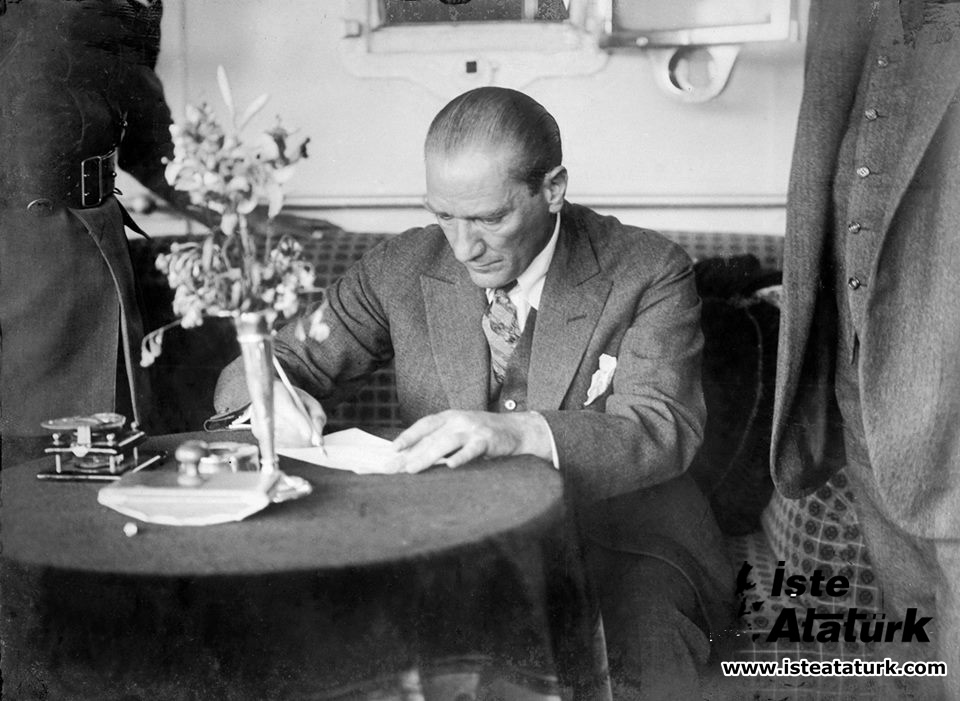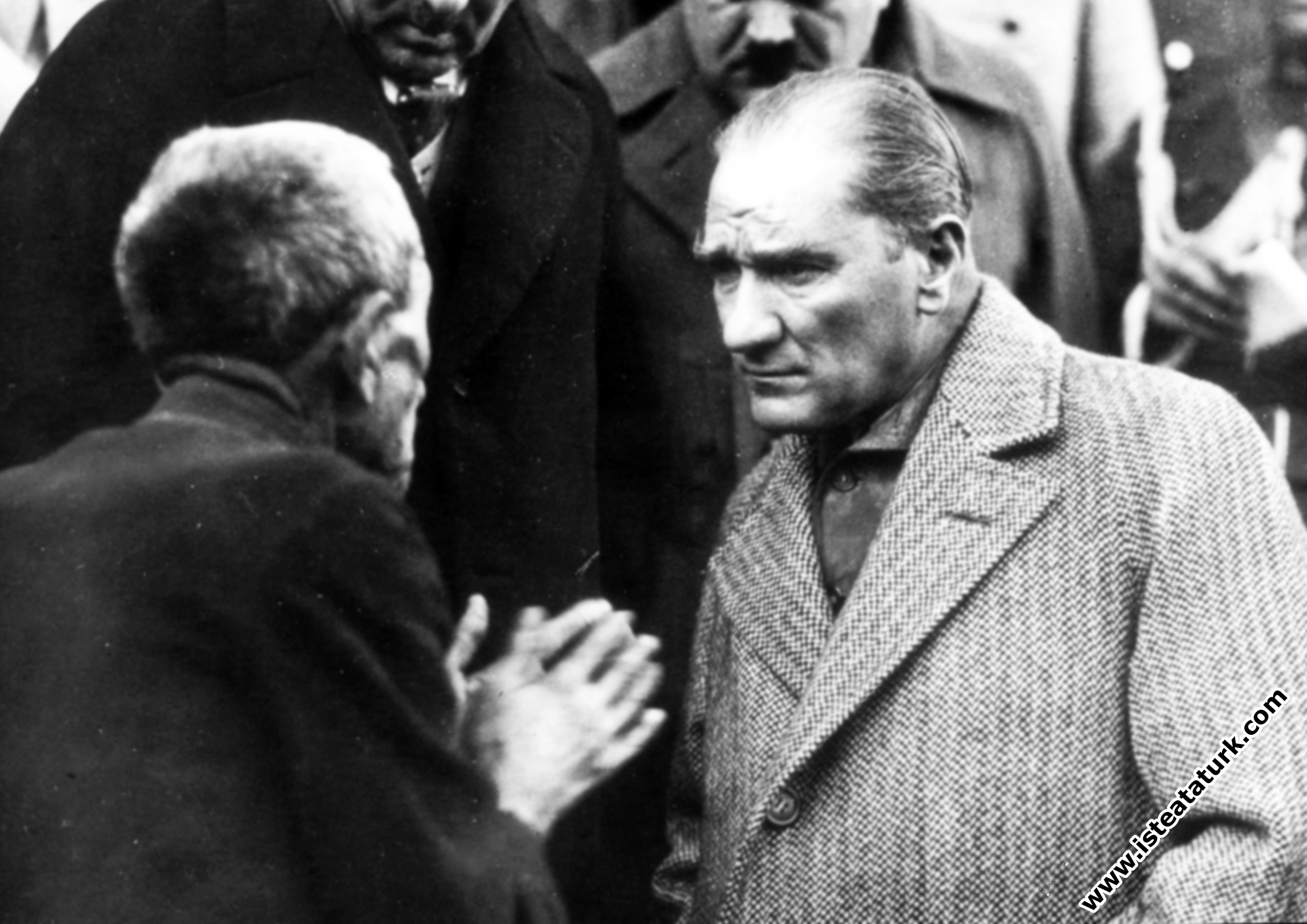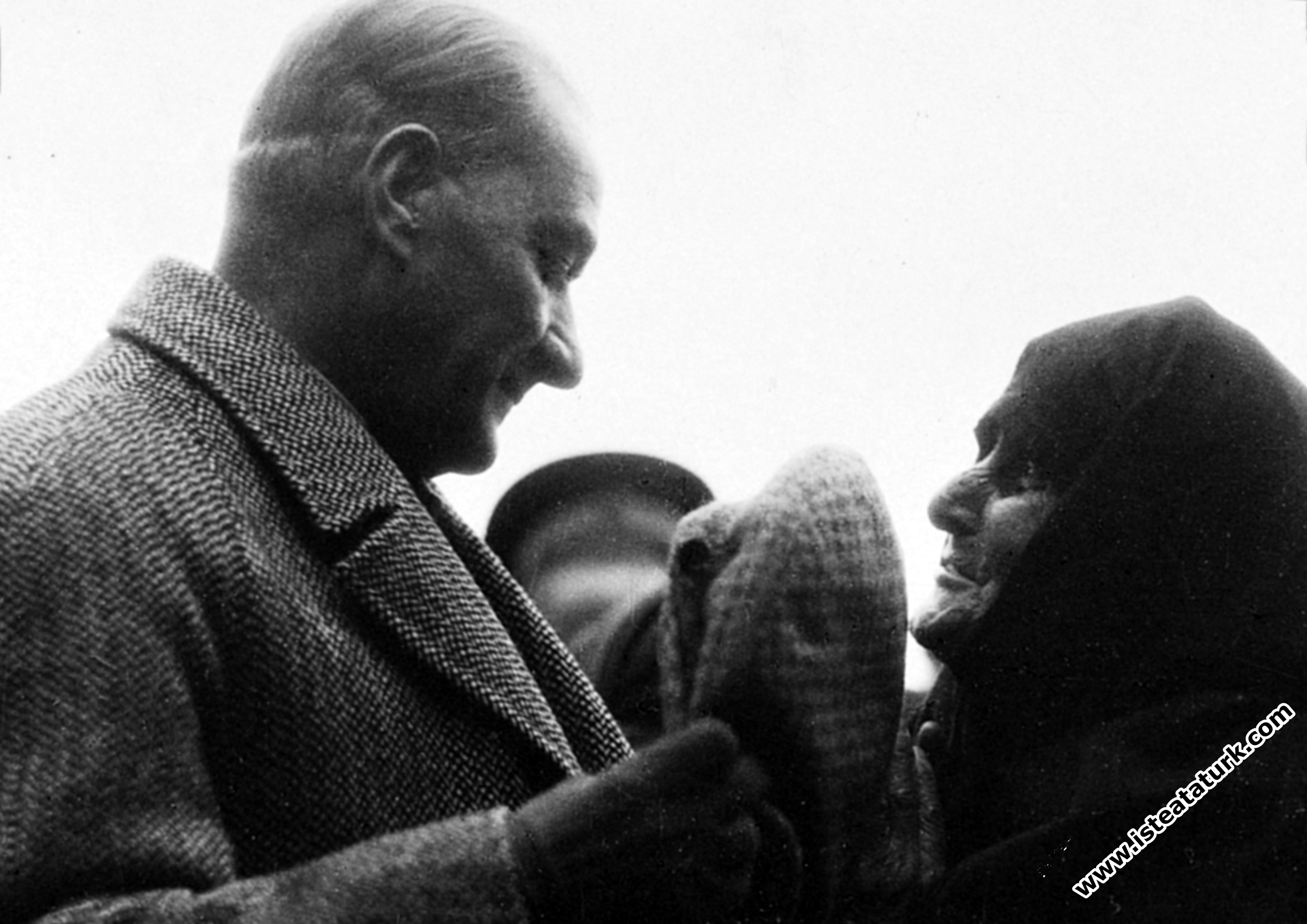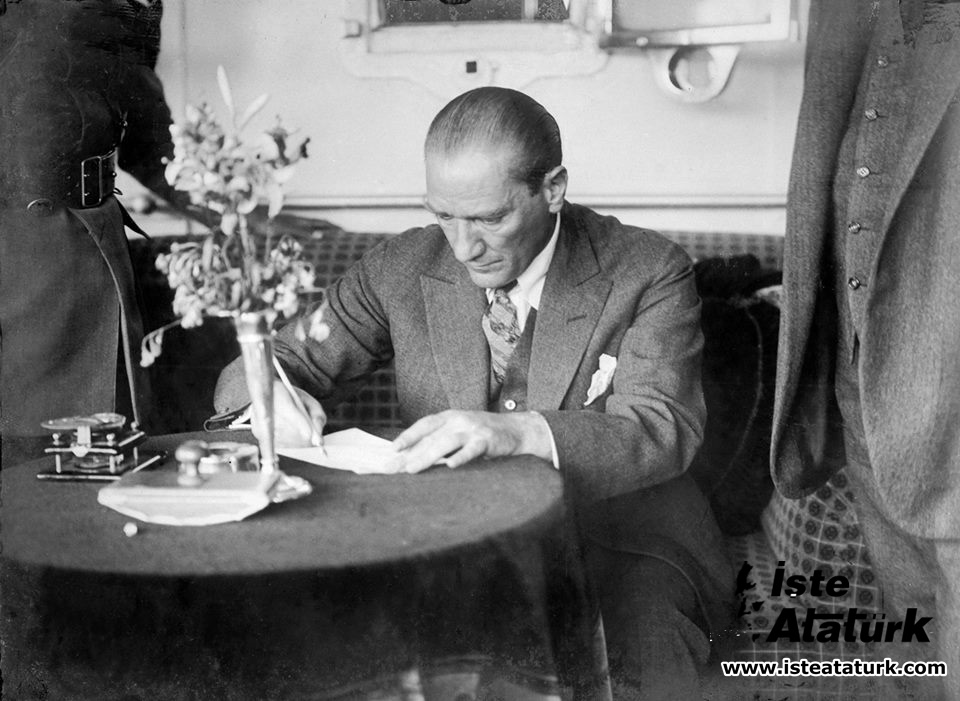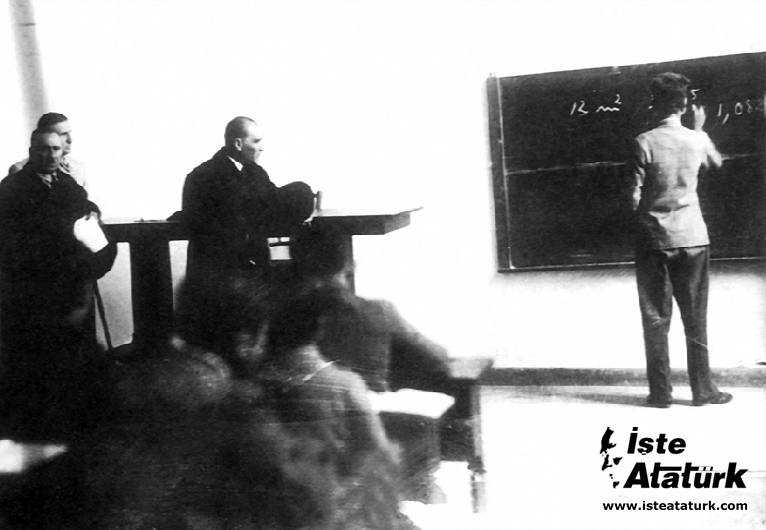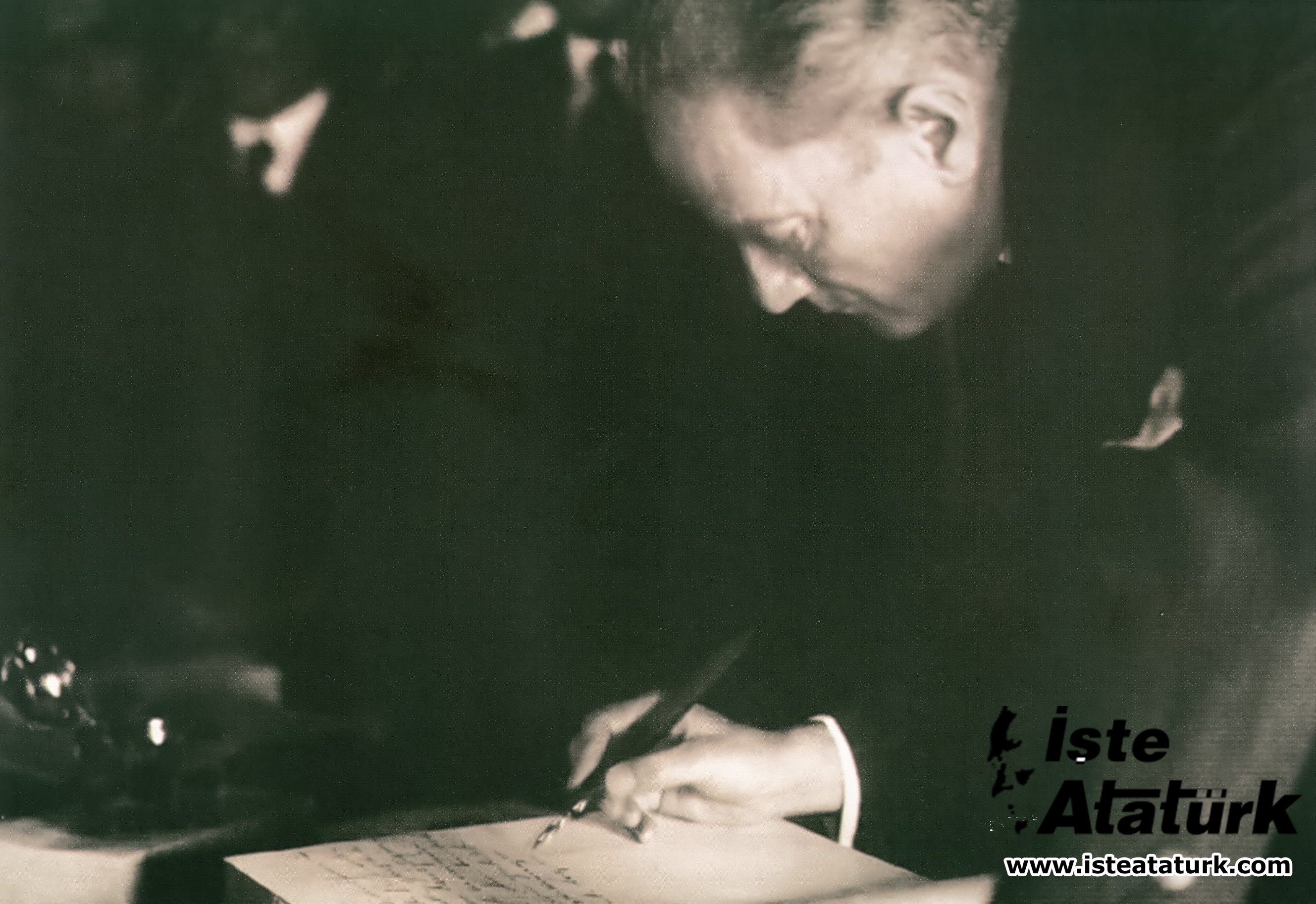
Kemalism and Atatürk's Principles
Character Size
“I don't want doctrine, we freeze. We are on the march.” Mustafa Kemal Atatürk
ATATÜRK'S PRINCIPLES AND PRINCIPLES
I will try to present the Principles of Atatürk, the founder of the Republic of Turkey and the only guide for the Turkish Nation, with their general lines, in this limited time.
Under the leadership of Atatürk, the Turkish Nation carried out the most magnificent revolutionary movement in the world in the most difficult period of its seven thousand-year history. This event, which the Westerners call the "Turkish Miracle", has been a way of salvation and a source of hope not only for the Turkish Nation, but also for all oppressed oppressed nations.
The Turkish Revolution does not only consist of action phases. The reform movements realized as a result of this deep-rooted and multidimensional movement, especially the independence movement to save the occupied Turkish homeland, undoubtedly constitute the action phases of the great Turkish Revolution. But there is another aspect that is much more rooted and important than all of these; This is the intellectual aspect of the Turkish Revolution, that is, the theory phase. The Turkish Nation broke the chains of captivity at the end of the War of Independence and gained its independence. But gaining independence and taking over its sovereignty is not the final goal for the Turkish Nation. The main goal was set by Atatürk as "to reach the level of contemporary contemporary nations". The method of achieving this goal is positive science; the source of inspiration is the high talent of the Turkish Nation, their familiarity with the good, the beautiful and the new.
Here, we call the idea side of the Turkish Revolution "Ataturkism". The Turkish Revolution is expressed as Kemalism or Kemalism in terms of ideas and ideals. Kemalism is to preserve and keep alive Atatürk's principles and the Turkish Revolution forever, no matter what. Kemalism is a whole with the goals, principles and the Turkish Revolution pointed out by Atatürk. Its goal is to make the country prosperous, prosperous and happy, and to raise the national culture above the level of contemporary civilization.
The principles of “Full Independence” and “National Sovereignty” in Kemalism are the basic elements of the newly established Republic of Turkey. Because our War of Independence developed on these two foundations. While the Turkish Nation was embarking on a war of independence against the western imperialist powers and embarking on a great struggle to save its country from occupation, it also fought against the sultanate in cooperation with the western imperialist powers in order to realize national sovereignty. As a result of this effort, those who held the sultanate had to leave the country together with the occupying forces. Considering these two important concepts as the most basic condition of existence in the modern sense, Atatürk has frequently used the concepts of “Full Independence” and “National Sovereignty” since the first days of the War of Independence; especially foreign policy, The domestic policy and enactment movements were entirely dependent on these two basic principles. As a matter of fact, the National Pact of January 28, 1920, which determined the foreign policy principles of the War of Independence, has taken its place in our recent history as a document inspired by the principles of "full independence" and "national sovereignty". summed up with the following words: “National sovereignty is the honor, honor and dignity of our nation”
Ataturk's Principles
The most basic lines of the philosophy of Kemalism consist of six principles that we describe as Atatürk's Principles. It can be said that these principles put forward by Atatürk are the golden keys that will lead the Turkish Nation to the line of modernization. Because these six principles constitute a whole that will lead the Turkish Nation to modernization in every respect. Modernization, on the other hand, is a continuous flow, continuous development and march. According to Kemalism, every achieved goal makes it permissible to turn to a new goal. The essence of this basic philosophy consists of six principles, which we call Atatürk's Principles.
The use of the phrase Atatürk's principles is necessary in terms of providing convenience. However, when using the phrase in question, it is extremely important not to make the mistake of considering and evaluating these principles separately from each other. Because the principles constitute an interdependent whole. However, I would like to say with regret that this issue has been hidden from the attention of many people, knowingly or unknowingly. For this reason, some people have considered some principles as basic principles according to their personal ideologies, while ignoring others. When some principles were not taken into account with the view that "it would be okay if it didn't happen", distorted and wrong interpretations that had nothing to do with Kemalism emerged. However, in the general whole that we call "Ataturkism", each principle is complementary to each other. In this understanding, Taking one of the principles forward or leaving the other in the background distorts the essence of Kemalism and upsets the balance in its systematics. For this reason, the principles that we call Atatürk's principles should be evaluated in the order that Atatürk stated. There is a very delicate balance between the principles. It is an inseparable whole. These principles were included in the second article of the 1924 Constitution, and then in the first article of the 1937 Constitution, in the following order:
1- Republicanism
2- Nationalism
3- Populism
4- Statism
5- Secularism
6- Revolutionism or revolutionism... (Atatürk used both these expressions).
Republicanism
In the Turkish Revolution, republicanism is the main principle, the main value. The essence of republicanism is to adopt the democratic republic as a regime of virtue as a form of state administration. The Republic, as a state and form of government that represents the whole of Atatürk's revolution, is an unchangeable substance. It is a principle that means giving sovereignty to the nation and that the nation has the sole say in administration. According to Atatürk; “National sovereignty is such a light that chains melt in front of it, crowns and thrones burn and disappear”. As a matter of fact, Atatürk saw and evaluated the great event that took place with the Turkish Revolution as the work of the Turkish Nation. For this reason, according to Atatürk, the most appropriate form of government for the creation, honor and understanding of the Turkish Nation is the republican government. The principle of the republic was preserved and established in both the 1924 and 1961 constitutions as a value that cannot even be proposed to be changed or put into another form. With this feature, it is the strongest guarantee that prevents personality and arbitrariness from dominating the republican state order and ideology.
Nationalism
The most basic aim is that the society, which will preserve the republican state structure, is a consolidated whole with the consciousness of political unity. Turks, in the real sense, attained the consciousness of being a nation as a result of the Turkish Revolution. Turkish nationalism is not a doctrine. It is a historical and political event. It has nothing to do with extreme racism, imperialism and fascism. Turkish Nationalism intellectually and de facto has a shared national unity.
Atatürk stated the meaning of the principle of nationalism with the following words he said to define the Turkish Nation and the Turk: “The Turkish people who founded the Turkish Republic are called the Turkish Nation”.
Atatürk also explained his Turkish nationalism as follows: “Every citizen who lives within the borders of the Republic of Turkey, speaks the Turkish language, grows up with Turkish culture, and adopts the Turkish ideal, is a Turk, a Turkish nationalist, no matter what religion or sect they are”.
Populism
The phrase “People” is a phrase used for the part of the Nation that is alive today, which has a much broader meaning. The term “People's Sovereignty” is also used in a broader sense as “Nation sovereignty”. As stated in the Constitution, legislative, executive and judicial rights belong to the nation.
The principle of populism does not accept the principle of class. The public is divided into occupational and working groups. Turkish society is in a balance of equality. There is not and cannot be a privileged class consciousness. Strict equality is foreseen for all citizens before the law. Populism is a result of the idea of Nationalism. Turkish people are one and a whole. According to Atatürk, the real owner and master of the Turkish Nation is the peasant, the real producer.
Statism
It is a principle that specifies more rational methods in social, economic and cultural development. In the economic field, it envisages the investment of the state as well as private capital. This principle desires that the capital in the hands of the state should be allocated to the development of the country, especially the infrastructure. It is not against foreign capital, provided that it benefits both sides and does not make the country a colony. It has nothing to do with the strict statism in communist countries; It is completely formed from the realities of the country.
The principle of statism is based on the mixed economy, as seen in the constitution. It is a clear and distinct view of the social state understanding. The principle of statism is a system specific to Turkey, born out of Turkey's needs.
Secularism
Atatürk envisaged the separation of religion and world affairs, and especially religion and politics. Religion is a matter of conscience. Everyone is free to obey the orders of conscience. Atatürk envisages respect for religion in his own way of thinking. He absolutely refuses to be against thinking and thought. However, religion and state affairs should not be confused with each other. No one can force another person to accept either a religion or a sect. Religion and sectarian rules can never be used as a tool in politics. In the secular understanding, there is a real respect for beliefs and therefore for religion.
Secularism has brought important contemporary values to the Turkish Nation:
In addition to the religious belief and intellectual freedom of the people, it provided freedom of conscience, belief and worship, and also led the nation to become a nation rather than an ummah. It has brought values such as gaining awareness of the sense of national unity and togetherness.
Although the principle of secularism was enshrined in the Constitution on February 5, 1937, the Turkish Nation has faced deliberate and purposeful attempts in recent years, which seem to have intensified against this principle. Despite the fact that it was included in the Constitution 61 years ago, the debate on the principle of secularism continues. The reason for this is that those who think of establishing a sharia state want to invest in their future, claiming that secularism is hostile to religion when their political and material interests are in danger. Another important issue is that despite the passage of so many years, unfortunately, our citizens have not been adequately told what secularism is. Those who are against secularism try to explain that secularism is irreligious in a planned, programmed and organized manner in every segment... Unfortunately, it has been turned into an ideology today. In the face of these propagandas, it is desired to confuse the minds of the Turkish people. However, this principle, which has been the property of the Turkish Nation, continues and will continue to illuminate the path of Turkish people in their march towards civilization.
Revolutionism
It is to forcibly demolish the institutions that have left the Turkish Nation behind recently, and to put in their place new institutions that will enable the nation to advance according to the highest civil requirements. Ataturk; “The aim of the reforms we have made and are making is to turn the people of the Republic of Turkey into a civilized society with all its meanings and forms, completely suitable for our age. By saying "This is the basic principle of the Turkish Revolution," he reveals the goal that Turkish society will reach through revolutionism.
The Turkish Revolution has neither an age nor a definite duration; because the revolution is permanent.
Atatürk, as noted by the famous historian Yusuf Hikmet Bayur; He did not accept the phrase "Ataturk's reforms" well. Instead, he wrote "Turkish Revolution" and wanted it to be expressed in this way. According to Atatürk; If this desire and development had not occurred in this nation, no strength or power would have been sufficient to make this revolution happen. So this revolution is the work of the Turkish Nation.
It can be said that these principles put forward by Atatürk are also the main lines of Kemalism.
There are also complementary principles that are extremely important in Kemalism. Although these are not counted among the six principles, they are extremely important in terms of revealing Kemalism's view of the world and people. Let us give a few examples regarding these principles, which are mostly put forward in the form of aphorisms:
“Turkish Meal, Work, Trust”
"Peace at home peace in the world"
“Sovereignty unconditionally belongs to the nation”
“A Turk is Worth the World”
"The strength you need in the noble blood in your veins."
"How happy is the one who says I am a Turk"
As each of these aphorisms are related to each other, they also have deep meanings on their own. For example, when we talk about "Peace at Home, Peace in the World", we see how superior the love of humanity and humanity is in him. Atatürk explained this maxim himself as follows: “The whole human world is like a human body. Just as the whole body is affected a little after the pain in a person's finger, any unrest among the nations of the world will soon become the unrest of other nations”.
If the nations of the world had heard and obeyed this statement of Atatürk, we would have been the people of a world where the winds of peace, happiness and peace blow, instead of the smell of blood, tears and gunpowder as it is today, and people who are unsure of their future.
With the words "The power you need is in the noble blood in your veins", Atatürk declared that the divine power has never been extinguished in the veins of the Turks and that it will never go out.
All these listed principles constitute the systematic way of thinking that we call Kemalism. Kemalism, on the other hand, is achieved by sticking to these principles and putting them into practice.
Kemalism is the flagged name of Atatürk's love effort to reach western civilization.
Kemalism is to preserve and keep alive Atatürk's principles and the Turkish Revolution forever, no matter what.
Kemalism means loving your country and nation more than your life.
Kemalism draws its strength from a realistic, progressive and continuous formation. In this respect, it is a continuous path of breakthrough and progress that will live on forever.
Kemalism is rationalism and scientific.
Kemalism always expects new breakthroughs and new initiatives. The moment we see it as an ideal that has completed an outdated thought function, we move away from Kemalism. Kemalism is not to see and think our personal and political interests above the interests of the nation and country. Kemalism can never be frozen. Because Kemalism is not dependent on doctrine. When the Republican People's Party was founded, the general secretary of the president, Prof. Dr. Yusuf Hikmet Bayur, “What should be the doctrine of this established party?” When Atatürk asked, “I don't want doctrine, we will freeze. We are on the march.” he said. For, only scientific research guides humanity, not doctrines.
M. Vehbi Tanfer
Source: ATATÜRK ARAŞTIRMA MERKEZİ DERGİSİ, Sayı 42, Cilt: XIV, Kasım 1998, Türkiye Cumhuriyeti'nin 75. Yılı Özel Sayısı
